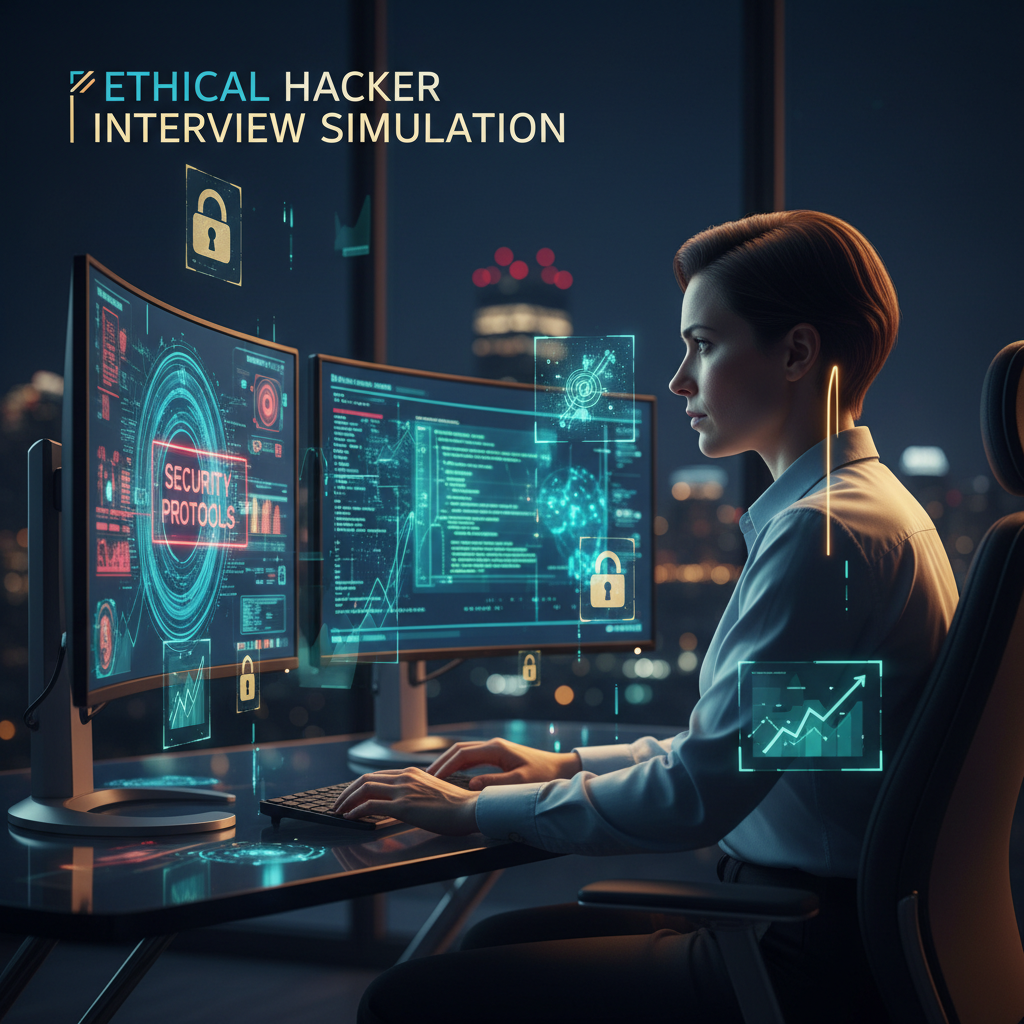Top Ethical Hacker Interview Questions & Tips for 2025 | Ace Your Cybersecurity Interview


Ready to ace your ethical hacker interview? Try Huru.ai now for unlimited, AI-powered interview practice with instant, actionable feedback. Build unshakeable confidence and land your dream cybersecurity role!
Unmasking the Interview: What Do Ethical Hacker Recruiters Look For?
Ethical hacking interviews aren’t just about technical prowess—they’re about mindset, adaptability, and your ability to stay ahead of ever-evolving cyber threats. Recruiters want to see if you can think like a hacker to defend organizations from real-world attacks. In this guide, you’ll discover advanced interview questions, expert strategies, and actionable tips to help you break through the noise and prove you’re ready for the frontlines of cybersecurity.
Why does mindset matter? Because today’s threats aren’t static. Employers want candidates who are proactive, curious, and ethically grounded—ready to anticipate risks before they happen.
What skills are non-negotiable?
- Technical expertise—network protocols, cybersecurity tools, exploits
- Analytical thinking—breaking down complex problems
- Ethical judgment—knowing what’s legal and right
- Clear communication—explaining vulnerabilities and remediations

Scenario-Based Questions: Prove Your Hacker Mindset
Interviewers increasingly use scenario-based questions to assess if you can apply your knowledge, not just recite it. Here are some real-world scenarios you might face:
1. Penetration Test Gone Wrong
Imagine you’re conducting a penetration test and accidentally disrupt a critical service. What immediate actions do you take? How do you communicate this to the client?
2. Social Engineering Simulation
You’re tasked with testing an organization’s resistance to phishing. Walk through your approach, from information gathering to crafting a convincing email, while ensuring ethical boundaries are respected.
3. Zero-Day Vulnerability Found
During a client assessment, you identify a zero-day vulnerability. What are your next steps in disclosure and mitigation?
4. Cloud Security Assessment
How would you approach securing a cloud deployment differently from a traditional on-premise infrastructure? What unique attack vectors do you consider?
5. Real-World Application Exploit
Given a legacy web application, what are your first steps in identifying and exploiting vulnerabilities—while documenting your process for remediation?
Don’t just describe what you’d do—explain why you’d take those steps. Show your reasoning, risk assessment, and ethical considerations.
💡 Key Takeaway
The best answers to scenario-based questions combine technical knowledge, ethical reasoning, and clarity of communication. Practice explaining your thought process out loud—Huru.ai’s instant AI feedback makes this easy and stress-free. Try a scenario-based mock interview now!
Tools of the Trade: Must-Know Frameworks & Techniques
Recruiters love to quiz you on the technical toolkit and frameworks you use. Prepare for questions like:
- What pen-testing tools do you rely on and why? (Nmap, Metasploit, Burp Suite, Wireshark, John the Ripper…)
- Describe your preferred vulnerability assessment workflow.
- How do you use frameworks like OWASP Top 10 or MITRE ATT&CK?
- How do you keep your skills sharp with rapidly evolving tools?
- What’s your approach to automating repetitive testing tasks?
Interviewers may also explore your experience with scripting (Python, Bash), cloud security tools, and your ability to document findings clearly for both technical and non-technical audiences.
Pro Tip: Bring up real-life examples of how you’ve used these tools to uncover vulnerabilities, stay up-to-date, or train others.
💡 Key Takeaway
Demonstrate not only your mastery of industry-leading tools but also your ability to adapt and learn. Share stories of troubleshooting and continuous improvement—this stands out in interviews!
Beyond the Basics: Advanced, Cutting-Edge Interview Questions
Top employers go beyond generic questions, focusing on advanced, real-world challenges. Be ready for:
- How do you identify and defend against Advanced Persistent Threats (APTs)?
- Discuss a time you automated your threat detection using AI or machine learning.
- What’s your approach to securing IoT or blockchain environments?
- How do you assess supply chain security risks?
- Describe your strategy for conducting red team vs. blue team exercises.
- How would you handle quantum computing vulnerabilities?
Don’t hesitate to reference cutting-edge technologies and current cybersecurity trends. Employers want lifelong learners who can keep pace with the threat landscape.
For a real competitive edge, use Huru.ai’s advanced AI-powered scenarios to practice these high-level questions.
💡 Key Takeaway
Stay ahead by studying trends like cloud security, AI in cybersecurity, and emerging threats. Showing your awareness of evolving risks makes you a standout ethical hacker!
Ethical Judgment: Legal, Social, and Moral Dilemmas
Interviewers will test your ethical boundaries. Be prepared for questions like:
- How do you ensure all your activities are legal and authorized?
- What’s the difference between white hat, black hat, and gray hat hackers?
- Describe a situation where you refused to cross an ethical line, even under pressure.
- How do you handle sensitive data and privacy issues?
- What international frameworks or laws guide your ethical hacking engagements?
Employers want to see your commitment to responsible disclosure, data privacy, and navigating legal/ethical gray areas. Articulating these principles confidently is critical—practice with real-world dilemmas in Huru.ai mock interviews.
💡 Key Takeaway
Ethical judgment is as important as technical skill. Companies need to trust you with their most valuable assets—show you understand both the law and the spirit of cybersecurity.
Q&A Rapid-Fire: Most-Asked Ethical Hacker Interview Questions (with Sample Answers)
A: Vulnerability assessment identifies potential weaknesses, while penetration testing actively exploits these weaknesses to determine actual risk. Both are crucial, but pentesting is hands-on and simulates real-world attacks.
Q: Which encryption algorithms do you recommend and why?
A: AES-256 is widely preferred for symmetric encryption due to its strength and efficiency. For asymmetric encryption, RSA and ECC are commonly recommended for secure data transmission.
Q: How do you keep your knowledge up to date?
A: I follow leading cybersecurity blogs, attend industry conferences, and regularly practice with labs and platforms like Huru.ai for the latest mock scenarios.
Q: What steps do you take to ensure legal compliance in your assessments?
A: Always obtain written authorization, define scope clearly, and adhere to legal/industry standards.
Q: Describe a time you used automation to enhance your testing process.
A: I used Python scripts with open-source tools to automate repetitive scanning tasks, saving time and ensuring more comprehensive coverage.
Level Up With Huru.ai: Practice, Feedback, and Confidence
The secret to acing interviews is practice. With Huru.ai, you get unlimited ethical hacker mock interviews and instant, personalized AI feedback on both your technical responses and communication skills.
- Practice real-world ethical hacking scenarios—anytime, anywhere
- Get immediate, actionable feedback on your answers and interview presence
- Track your progress and build unshakeable confidence for high-stakes interviews
Don’t just prepare—master the art of the ethical hacker interview with Huru.ai.
Watch: Ethical Hacker Interview Questions Explained (Video Guide)
Explore More Interview Mastery Guides
Want insights for other roles? Check out:
- Overcoming Obstacles: Telling Stories of Resilience in Interviews
- Crack the Code: AI-Driven Insights to Ace Your Next Interview
- Human Resources Manager Interview Questions: Attract Top Talent
Level up your interview game with the latest career tech.
About the Author
Elias Oconnor is a seasoned content writer at Huru.ai. With a passion for cybersecurity and a commitment to empowering job seekers, Elias crafts in-depth resources that blend technical accuracy with actionable strategies. His writing helps candidates transform anxiety into interview mastery—one question at a time.


 Aug 07,2024
Aug 07,2024  By Elias Oconnor
By Elias Oconnor